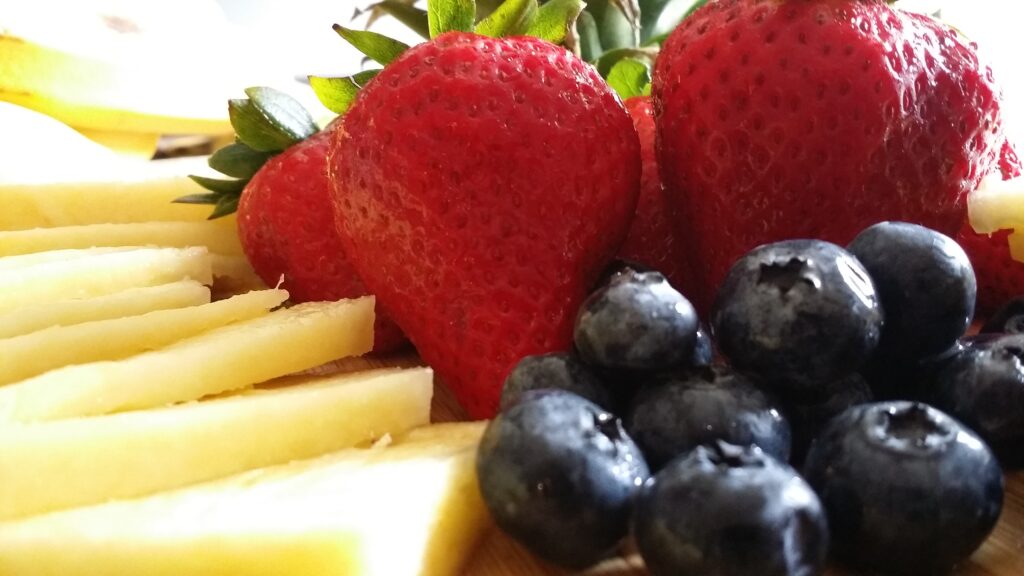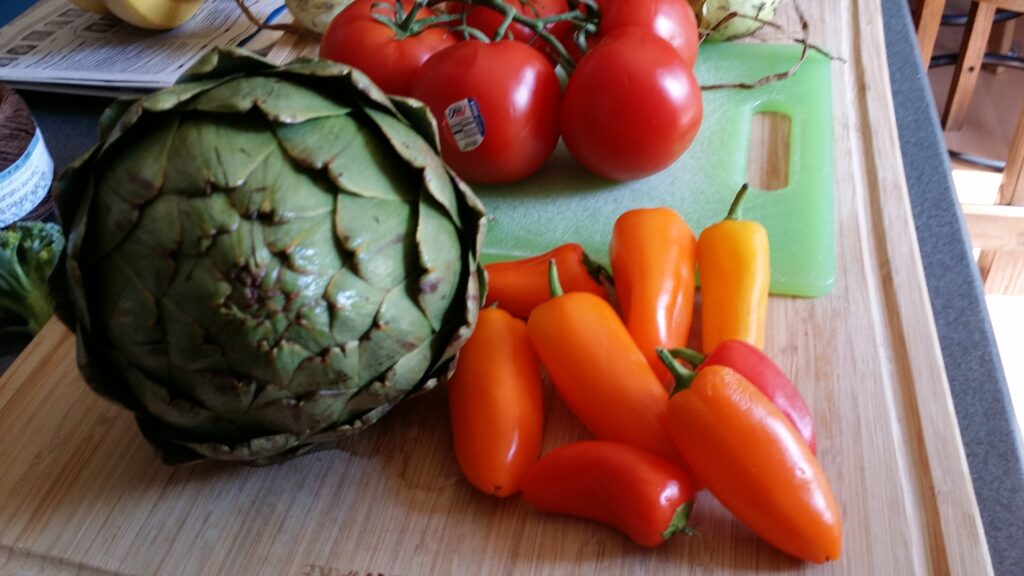Week 2 of Strategies for Lasting Change
Tastes are powerful motivators and distractors! Did you know our taste buds replenish themselves every ten to twelve days? (1) New cells can develop new tastes that satisfy as we begin to learn the value of intentional eating and why God’s Garden is so Good.
More importantly, tasting the Word of the Lord has more value and purpose than what He placed in the garden. King David, the Psalmist reminds us:
Oh, taste and see that the Lord is good! Blessed is the man who takes refuge in him! Psalm 34:8
We develop a taste for physical foods when we are in our mother’s womb. Shortly thereafter, as we develop and grow, we learn about tastes of a spiritual sense.
For instance, a fetus develops taste buds in her mother at around 10-13 weeks’ gestation. (2) Food flavors are transferred to the fetus through the continuous swallowing of amniotic fluid in the womb. Whatever the mother eats consistently throughout her pregnancy, is present for her child’s future preferences.
We all have favorite tastes. Some prefer the dark, rich, brew of morning coffee while others a fresh cup of juice. We consume salty chips with relish or a mouth-watering chocolate brownie fix with delight. The palate preferences of bitter, salty, and sweet all evoke emotions and satisfy.
However, the one thing they all have in common… taste is fleeting.
It’s here one moment and in the belly the next. There is no lingering contentment, just desire for more. Furthermore, our memory of it creates mouth-watering anticipation when our eyes see the favored morsel again.
On the other hand, the idea of tasting the “heavenly gift” and the “goodness of God’s word” is far superior to any earthly item we consume (Hebrews 6:4-5). It provides lingering contentment for our souls. When we are transformed by the power of the Holy Spirit, we crave and savor God’s word more than our favorite meal.
Therefore, strategies for lasting change in tastes that satisfy begin with these simple steps:
Appreciate the flavors you are experiencing by slowing down the chewing process to 20 -30 seconds. Savor your favorite taste slowly and leisurely. Jean Kristellar, PhD., developed a Mindfulness Eating Program to help people with eating disorders. She suggests to be aware of all the flavors in the food, as well as the feelings associated with hunger and fullness. The more aware a person is of those true hunger pains and fullness, the less likely he is to overeat.
Research shows the first two bites of food a person eats are the most pleasurable, then taste sensation diminishes. So, a technique suggested in Kristellar’s program is to pick a favorite snack and make the first two bites last in your mouth a whole minute. One square of chocolate, for instance, may be enough to meet the pleasure spot on the pallet rather than an entire candy bar loaded with sugar and calories.
Replace sugar-loaded sides as the main meal or desserts with fresh fruit. Whole fruits, rather than fruit juice, provides nutrients and fiber alongside their natural sweetness. If the fresh fruit is chosen as dessert the meal itself will have plenty of protein to avoid sugar spikes and lows.
However, if it replaces a sugary breakfast choice, add a couple of walnuts or almonds for protein. An example of this is peanut butter on an organic apple for breakfast or kiwi and plain yogurt with walnuts. The quality nutrients in this choice will give us more energy, and a sense of fullness throughout the morning.

Spelt & Walnut Breakfast Bowl. 

Yogurt & Chia Seed Fruit Bowl
Doughnuts and sugar-laden cereals have next to zero nutritional value for children and adults. Making them a part of everyday life damages the body’s cells and leaves them hungry for real food. Nutrient depleted items like these were not on our Creator’s mind when He made us.
Give Vegetables Another Chance
Intentional eating approaches vegetables with a new mindset. It means changing the focus from an experience of “How will this make me feel?” to “How will this nourish me to do God’s work?” The more one understands the benefits of vitamins, minerals, and antioxidants in food, the more value it holds. The nutrients available supply added energy, stamina, and vitality. All important factors in living an abundant life and fulfilling our calling.
“When I was a child, I spoke like a child, I thought like a child, I reasoned like a child. When I became a man, I gave up childish ways.” 1 Corinthians 13:11
Although some people are reluctant to consume vegetables, it is a good idea to give them another try. Tastes and values change as we age and it takes several tries of various plants to develop a desire for them. Also, when tastes are accustomed to high amounts of sodium and sugar in processed food, the taste buds are trained and expect more of the same substances.
Retraining the taste buds can happen though, with good seasoning and highly fragrant spices.

Snap Peas & Kale 
Cauliflower & Asparagus Medley 
Artichoke
Fasting From Processed Food with Prayer
Removing processed food from the pallet for four weeks will diminish the desire. I know, who does that now days? We as Christ-followers, that’s who. A fast of this nature can be done with prayer and scripture memorization.
Jesus said, “It is written “‘Man shall not live by bread alone, but by every word that comes from the mouth of God” Mathew 4:4
He also said:
Jesus said to them, “I am the bread of life; whoever comes to me shall not hunger, and whoever believes in me shall never thirst. John 6:35
The goal is to look beyond food for emotional satisfaction and think logically about what you and me, as Christians, consume each day. Do we live as though every day is a feast day? Or, do we practice restraint when we sit down for a meal? “Are you and I eating mindlessly and not chewing slowly and savoring each bite with gratitude? I must admit, I am guilty of this more than I care to admit.
Eat Less Often and Smaller Amounts
People in Jesus’ day walked everywhere and ate what was available fresh. They ate fresh milled bread, curds, cheese, fish, fruits, and vegetables (Gen 18:8, Deut. 32:14, Gen 1:29, 1 Sam 17:18, 2 Samuel 17:29, Daniel 1:12-16 ESV) We have an idea of how much was acceptable to eat daily from the amount of manna the Israelites collected in the wilderness. The dry measure of one omer was about 3.7 quarts of bread per day for the entire family (Exodus 16:16).
A Simple strategy to implement as we follow their lead is to stop eating between meals and after dinner at night. Another is to remember the size of our stomach is roughly the size of our hand and using a plate that size helps us with portion control. Although the stomach’s stretching capacity is 40 times that size, Hiatal hernias and reflux disease are common among those who practice testing its limits.
Eating items rich in fiber, protein and nutrients may not only help us feel full, but remove cravings. Drinking water to offset false hunger is helpful alongside the first step of eating slowly during our meals and recognizing when we are truly hungry and full.
I hope with prayer and gratitude towards God and His provision, we will truly appreciate tastes that satisfy. More importantly, may we learn to rely on the goodness of His Word as the taste that truly satisfies! I am confident the strategies for lasting change can be done when our focus is off ourselves and on God.
Don’t forget, I am on this journey with you and I am here for you!
References:
Anatomy, Head and Neck, Tongue Taste Buds – StatPearls – NCBI Bookshelf (nih.gov)
AlJulaih GH, Lasrado S. Anatomy, Head and Neck, Tongue Taste Buds. [Updated 2021 Aug 11]. In: StatPearls [Internet]. Treasure Island (FL): StatPearls Publishing; 2022 Jan-. Available from: https://www.ncbi.nlm.nih.gov/books/NBK539696/
Developing and regenerating a sense of taste (nih.gov)
Barlow LA, Klein OD. Developing and regenerating a sense of taste. Curr Top Dev Biol. 2015;111:401-19.
By Amy Novotney, November 2012, Vol 43, No. 10 Print version: page 42







